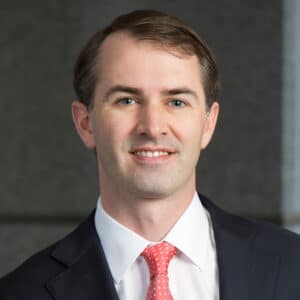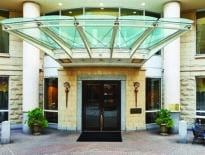Name: Quentin Hart
Title: Partner, McCord Development
Age: 35
Industry experience: 10 years
Bay Stater-turned-Texan-turned-Bay Stater Quentin Hart is leading expansion efforts by one of Greater Boston’s newest players in the life science space: Houston-based developer McCord.
The 45-year-old, family-run company recently bought a nearly 65,000-square-foot Northborough biomanufacturing facility from Alexandria Real Estate Equities. McCord plans aesthetic and systems updates to the 1986 building, which was previously home to GlaxoSmithKline.
The purchase is McCord’s first in Massachusetts and one of its first in the life science sector. The company otherwise specializes in office, industrial and multifamily real estate. Its signature project is Generation Park, a massive, master-planned mixed-use development in the northeast suburbs of Houston that aims to become the area’s business hub.
Q: Introduce McCord to our readers: What are its specialties and what sets it apart from the crowd?
A: McCord is a fully integrated real estate company based in Houston and in Boston. We’re primarily focused on growing our presence here in New England and on growing Generation Park, our 4,200-acre development in Houston. One thing that’s different about our company is that we have a land planner, an architect, multiple civil engineers, a scientist and a restaurant operator on our team, in addition to what you might think of as the traditional real estate specialties. This is the result of an intentional focus on where the rubber meets the road in providing environments that work and are fine-tuned for our tenants.
Q: McCord’s recent acquisition in Northborough looks like its first foray into life science real estate. Is that true, and how is the company gearing up to grow in this unique space?
A: While the last six months have had a focus on life sciences and Northborough is our first visible step, it’s a move that’s been going on for about three years. McCord was born out of the city [Houston] with the largest hospital complex in the nation, and that has shown us how vital advances in medicine are. We will grow and hire as needed with the company’s growth and our need to deliver to our tenant customers. I will say that Northborough is one of the first projects of this nature both in the area and elsewhere in the United States.
Q: Why did the company chose to expand in Central Massachusetts first, when there are so many options for investments in the region? And how fast are you looking to grow?
A: Well, I think that there are a variety of locations and clusters around Massachusetts that have various attributes but one thing that attracted us to MetroWest and Central Mass. is mobility and access to talent. A company that locates there has access to the Boston and Cambridge academic cluster that we talk about so much, but also the Worcester cluster, and it provides access for these companies to employees living in nearby communities with great variety in terms of housing types. It’s one reason we do see established companies growing in this area, but also see new companies starting to grow there.
There’s no predetermined speed or pace [to our growth] We’re looking for opportunities to make contributions to properties that may be underutilized and create solutions that didn’t previously exist. We let opportunities present themselves and be open to ideas and listen to what tenants want. We position ourselves to provide that most directly, whether it’s lab space or housing or something else. [Our choice to expand in Massachusetts] isn’t focused on life science real estate, but that was one of the main intentions behind the desire to grow here.
Q: With regards to the Northborough deal, what’s McCord’s vision for that property? And what’s the most important component of an industrial repositioning in today’s world?
A: The most important service we can provide to tenants of these properties is to create an environment that’s optimized to their needs and do so with certainty. These companies [in the life science sector] are so long-term by their nature, and the need for space is largely event–driven. It may coalesce around a funding round or a positive phase of clinical trial feedback or an FDA approval, so what they’re looking to do is continue their science without interruption. We try to take the real estate risk out of the equation. We often say at McCord that our company’s mission is to take the risk out of yours.
In Northborough, that was an R&D and manufacturing building, so our objective is to provide an environment for a first-class life science company to operate there, and that includes extensive upgrades to the building. … What we’re talking about out here in Northborough is that function is important. At the same time, we believe aesthetic is important. It’s important for [a tenant’s] employees but it’s important for the community as well.
Q: You’re a relatively recent arrival from Texas. What’s the most surprising thing you’ve encountered or learned about our local real estate world?
A: I was born, raised and now live northwest of Boston. It is my home, so I guess you could say that I’ve re–arrived in Boston. I would say that one thing that seems counterintuitive [about the area’s real estate community] is how many of our Texas-based peers have contributed to the area. You have Hines, Trammel Crow and others. I think that really says something about Boston and Massachusetts and the desirability of the area.
Q: Are there any business lessons you’re bringing with you from Texas?
A: In our experience as land planners and developers of a large community in Texas, we think a lot about integrating uses and understanding how our project connects to properties next door. That means planning for humans first and pedestrians first. One thing people contrast between Boston and Texas is [having] zoning versus [having] no zoning. One unintended effect of zoning is that it sometimes gives developers a hall pass from thinking about these issues because it’s predefined. Not to say that there aren’t a lot of tremendous peers we can learn from in Boston, but we are bringing a lot of what we learned with us.
Jokingly I would say that we have a lot of work to do on your breakfast tacos, but practically speaking on the matter of real estate, that’s really it. In Texas, a focus on that integration of spaces is focused on the exterior and the outdoors. You might say that Houston has more temperate weather, but it has its own extremes. It has heat. It requires you to look with eyes wide open at your surrounding environment and how it would impact your project.
The Top Five Construction Machines According to Hart’s 3-Year Old:
- Backhoe
- Skid steer
- Forklift
- Excavator
- Grader




 |
| 

